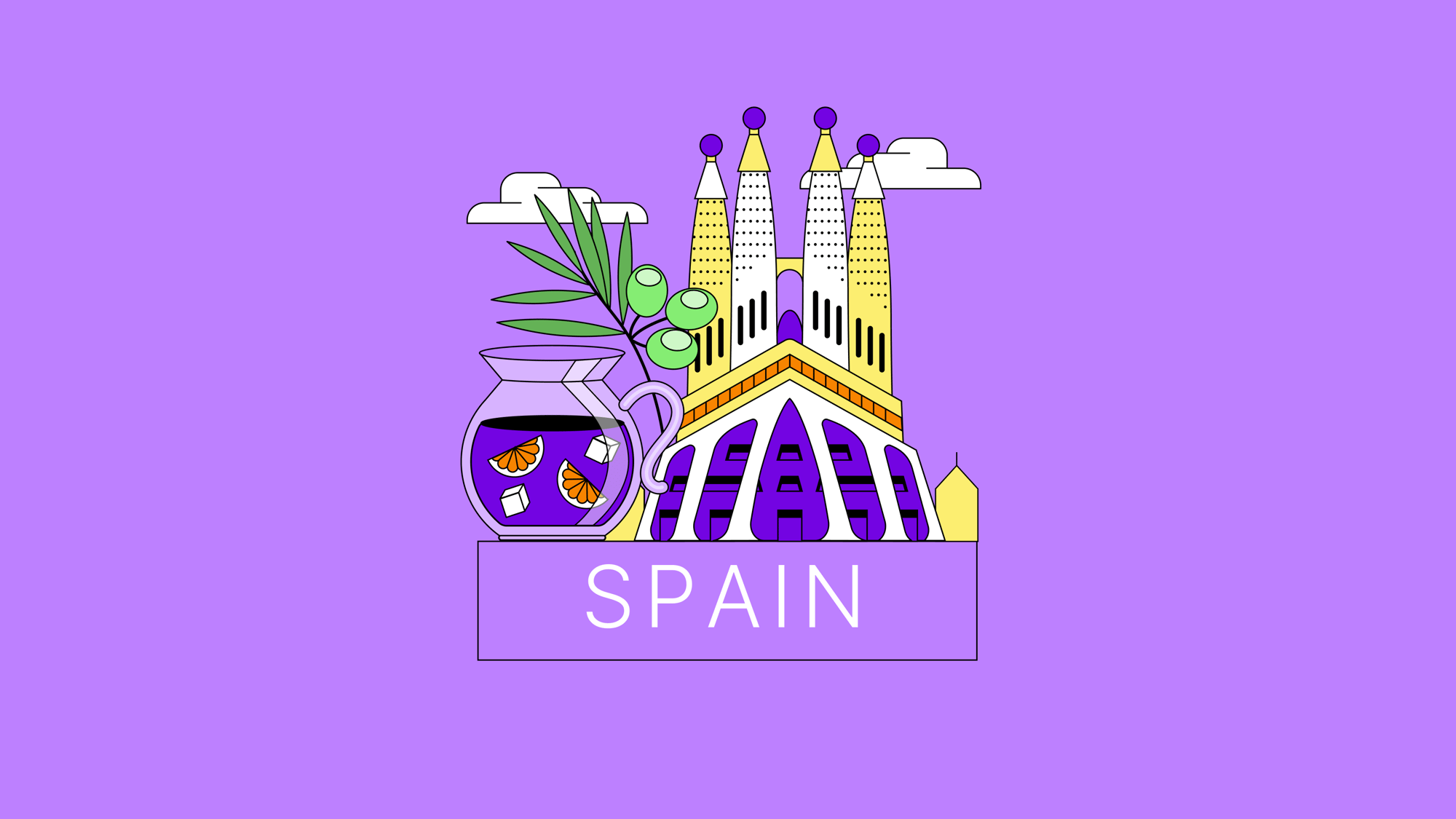
Moving to Spain: A Guide for Expats and Digital Nomads
.jpg)
Key takeaways
- With its relatively low costs and high quality of life, Spain has emerged as a popular choice for expats.
- Applying for one of the many Spanish visas and finding jobs calls for thorough research and careful planning.
- Deel’s step-by-step guide shows you how to effortlessly navigate the Spanish visa process and settle into your new home.
Spain is a popular destination for workers, and the number of foreign residents in the country has grown exponentially in the last few years. With the rise of remote work as a mainstream trend, an increasing number of expats and digital nomads are choosing to move there, seeking a more affordable and laid-back way of life.
Spain has also made it increasingly easier for foreigners to obtain permanent residency or citizenship. As a member of the EU and the Schengen Zone, the country provides various pathways to residency, including programs like the Golden Visa.
While moving to Spain can be rewarding, there are obstacles to overcome and pitfalls to avoid. So thorough preparation is key to success. Our guide takes you through all the necessary steps to ensure the most successful start for your new life in Spain.
Step 1: Prepare your documents for immigration to Spain
Before making the move to Spain, you must ensure that you are eligible to stay in the country and apply for the necessary visa if needed. Here’s what to consider:
EU countries
If you're from an EU country or Switzerland, you're in luck! You can skip the visa application process and freely live, work, and study anywhere in Spain. British citizens residing in the country before January 1, 2021, can register for residency with the Spanish border services, Servicio de Extranjería.
However, regardless of your nationality, you must obtain a residence permit if you plan to stay in the country for more than 90 days.
Visas for non-EU citizens in Spain
The Spanish government provides various visa options for non-EU citizens looking to enter the country:
- Tourist visa: Allows you to visit for a maximum of 90 days within a year to experience the lifestyle and culture.
- Job seeker visa: Spend up to nine months (with the possibility of extension) searching for jobs in your chosen field, providing proof that you can financially support yourself.
- Seasonal work visa: Stay in Spain for up to nine months or the duration of your employment contract, primarily for specific industries like retail, hospitality, and construction.
- Startup visa: Present your business proposal for the opportunity to launch your business in Spain.
- Self-employed visa: Register as a freelancer or sole trader, with an application fee of €7,200 ($7,200).
- Digital nomad visa: Work online for up to two years, proving you have a monthly income of around €3,040 ($3,200) and savings of €36,500 ($38,000).
- Residency visa: Apply to stay in Spain for one to three years with a Spanish sponsor. You must obtain your residence permit within the first 90 days, but it's renewable as long as your work contract lasts.
- Retirement (D7) visa: Demonstrate sufficient means through passive income, making retirees eligible.
- Spain golden visa: Invest over €250,000 ($260,000) in Spanish business to secure an indefinite stay.
Moreover, Spain participates in the EU Blue Card scheme, which encourages global mobility. Eligible applicants must earn at least 1.5 times the national average and have a minimum of five years of experience in their field.
If you hold a residence permit, immediate family members can apply for a reunification visa to join you, provided they are spouses or dependent family members.
Visa sponsorship in Spain
Unless married to a Spanish citizen, non-EU travelers need a legal sponsor to work there. This can be an employer or an employer of record (EOR) who must be able to demonstrate that they attempted and failed to hire individuals from EU member countries before looking abroad.
Essential immigration document checklist
To avoid delays and complications, gathering all necessary documents before initiating the Spanish visa application process is essential. Depending on your visa type, these documents may include:
- Passport (plus copies): Ensure your travel document is valid for at least six months beyond your intended stay, with at least two blank pages.
- Passport-sized photos: Standard dimensions are 35mm by 45mm, and the photo should not be older than six months.
- Visa application form: Download, fill in, and sign the application form, adhering to specific requirements for your visa type.
- Proof of outbound travel: Provide a copy of your airline boarding pass or public transport tickets.
- Insurance documents: Demonstrate you have at least €30,000 ($31,500) in medical coverage for your visit.
- Accommodation details: Provide the address where you intend to stay during your visa duration.
- Proof of employment: Present your job offer letter or signed employment contract if you apply for a work visa.
- Criminal record check: Some visas may require a police clearance and fingerprints.
- Educational certificates: Provide evidence of qualification to work in your chosen field.
- Financial records: Many Spanish visas require proof of sufficient means to ensure you won't be a burden on the state.
- Marriage and birth certificates: If relocating with your family, they'll need these documents to apply for dependent visas.
Importance of authenticating and translating documents into Spanish
Spanish authorities may require the legalization of certain documents. If your country isn't under the Hague Convention, you should get your local Spanish consulate or embassy to authenticate your paperwork. Additionally, you may need to translate documents like birth and marriage certificates. It's advisable to use a professional service that can verify the accuracy of the translation and provide you with a sworn document.
Step 2: Manage your finances in Spain
Beaurocracy is not the only thing you will carefully need to plan, though. As you prepare to move to Spain, understanding and managing your finances will be your key to success. With proper budgeting, you can enjoy a comfortable lifestyle while still being able to save some money. Here's what you need to consider:
Cost of living in Spain
Take note of the following costs associated with living in Spain:
- Renting: In major cities, a one-bedroom apartment typically costs around €800 ($850), while in smaller cities and towns, prices drop to approximately €600 ($630).
- Buying property: Real estate in Spain is relatively less expensive than in other European countries, but there are high initial setup costs. Average real estate prices range between €1,300 and €4,400 per square meter, depending on the region.
- Food and drink: Groceries are generally affordable (an average of €50 per week, per person), and there's a growing range of budget-friendly white-label products. Local restaurants are also economical, with meals for two costing as little as €15 ($16).
- Transport: Gas costs and tolls are comparable to most of Western Europe. Public transportation is cost-effective, with fares around €1.50 ($1.60) for a one-way trip.
- Utilities: Spain has reasonable utility costs, although electricity rates are relatively stable, and will set you back between €100 and €150 a month, on average
Are you looking for more data and metrics? Find details and information on the cost of living in Spain here.
Taxation in Spain
Taxes are another important element to keep in mind when moving, so make sure not to overlook tax implications as you plan your financial life in Spain. The country operates on a proportional tax system, where your tax rate depends on your income bracket. While tax rates can change, they generally range from 15% to 50%.
There are exceptions to the standard tax rate, however. Expats, for example, may be eligible for Spain's Non-Habitual Residency (NHR) program, also referred to as Beckham Law. It stipulates that if you haven't been a resident in the country for the past five years, you can enjoy a flat rate of 24% on income generated in Spain.
In addition to income tax, you'll also need to pay council tax, known as Impuesto sobre Bienes Inmuebles (IBI). This tax is typically between 0.3% and 0.5% of the property value but can be as high as 0.8%.
Make sure to verify which authorities you owe taxes to and check if Spain has a treaty with your home country to avoid double taxation. Stay informed about any changes in tax regulations.
Banking and currency exchange in Spain
Managing your finances will be easier if you have access to a Spanish bank account. In most cases, having one may even be a requirement, so ensure you select the best banking options for you.
There's a selection of local and international banks where you can open a Spanish account. Keep in mind that you'll need to visit a nearby branch and provide proof of identity, address, and employment.
To open an account, you will also need your tax number, known as a Número de Identificación Fiscal (NIF) in Spain. Visit your nearest tax office to register for this number before your visit to the bank.
Similar to other EU countries, Spain's official currency is the euro. You can conveniently exchange money at “Cambios” (money exchange offices) or hotels in major cities.
Step 3: Arrange housing and accommodation in Spain
Securing suitable housing is not just a visa requirement but an essential step for a successful move. Here, we'll explore housing options in Spain and the necessary steps you should take.
Renting vs. buying in Spain
Given that prices in Spain are relatively accessible, you might contemplate investing in property. Ensure you have adequate funds to cover upfront costs, including deposits, transfer taxes, and insurance fees.
Properties in Spain may also require renovations, so budgeting for potential repairs is advisable.
If your stay is short-term or you're uncertain about your preferred location in Spain, renting may be a more practical choice. Particularly if you're arriving during peak demand periods, such as the summer months, in popular places like Barcelona, Madrid, or Valencia, booking accommodation well in advance is advisable.
Finding suitable housing in Spain
Spain boasts a variety of housing options, from modern apartment blocks to older, more traditional buildings. However, be prepared for potential challenges, especially in older homes, such as plumbing and electrical issues.
Utilize local websites like Idealista, Fotocasa, and Pisos to browse available properties. Filter your search based on accommodation type, budget, and desired location.
For digital nomads seeking tailored accommodations, Spain offers a plethora of options with strong internet connectivity, modern furniture, and amenities suitable for short or long-term rentals. Landlords often cater to this demographic, facilitating negotiation and the discovery of the perfect place.
Once you've identified a property, carefully review the lease agreement. The contract should include:
- A detailed description of the accommodation
- The agreed-upon rent amount
- Any security deposits, typically equivalent to two months' rent
- The term of the lease, usually spanning one year
- Your responsibilities concerning the property
- Information about whether pets are allowed
By understanding the housing landscape in Spain and taking these necessary steps, you'll be well-prepared for a comfortable and convenient living arrangement in your new destination.
Step 4: Consider career opportunities and working arrangements
Exploring job opportunities in Spain can be both challenging and rewarding. While one in three expats may express dissatisfaction with the job market, 78% find that their income supports their desired lifestyle in the long run. Additionally, Spain welcomes remote workers, allowing you to apply for a digital nomad visa.
Spanish job market overview
Before diving into the job market, research industry trends in Spain to identify the roles in demand. Utilize global platforms like LinkedIn and Indeed, or consult studies like those by the European Centre for the Development of Vocational Training (CEDEFOP). In 2023, the report highlights that administration and personal care workers are among the most sought-after positions in Spain.
Narrow down your search using industry-specific, local sites like InfoJobs, Tecnoempleo, and Indeed. Given Spain's popularity as a tourist destination, job opportunities often arise in hospitality, restaurants, and travel.
Note that many positions may require proficiency in Spanish. If you're not fluent in the language, explore employers that don't prioritize language proficiency using platforms like EnglishJobs and Europe Language Jobs.
Understanding work culture in Spain
Spain places less emphasis on efficiency and more on building long-term relationships with clients and partners. Face-to-face meetings are often preferred over digital communication, and bringing personalized gifts to clients and partners is customary.
Despite its unique business culture, Spain maintains working hours similar to many other European countries. Employees typically work from 9 am to 6 pm with an hour-long break, Monday through Friday.
Step 5: Organize healthcare and education in Spain
Once you obtain Spanish residency, you can access the country's robust public healthcare and education system. Consider the following options based on your needs, preferences, and budget.
Healthcare system in Spain
Residents in Spain can access the national healthcare service known as the Servicio Nacional de Salud (SNS). The quality of care is generally high, and the country ranks well globally, according to the World Health Organization (WHO). Consults, tests, and prescription services may incur small fees.
Private healthcare is also widely available and affordable throughout Spain. Private practitioners often work in separate departments within public hospitals. You can either see them directly or get referrals through your regular doctor.
When deciding between public and private healthcare, remember that many residents are on waiting lists to see a doctor. Opting for private health insurance provides immediate access to a general practitioner and specialized treatments.
Education options in Spain
As with healthcare, expat children in Spain can access public and private schools. Full-time education is mandatory for individuals aged six to 18, offering various choices, including public schools, faith-based private schools, international schools, or even homeschooling.
For higher education, Spain boasts reputable institutions such as the universities of Madrid, Barcelona, and Valencia. Tuition fees start at around €500 ($520) per year for EU citizens but range from €3,000 to €5,000 ($3,150 to $5,300) for non-EU residents. If you reach this stage, considering Spanish citizenship can help save costs.

Step 6: Ensure your safety while in Spain
While Spain is known for its generally low crime rate, it's important to be aware of potential risks, especially in tourist areas like the Costa del Sol and Barcelona, which may attract pickpockets and bag snatchers. Instances of burglaries and car thefts also occur, although violent crime remains relatively rare.
In case of emergencies, you can contact the Spanish emergency services at 112 or contact your country's embassy for assistance.
In recent years, the frequency of heatwaves and forest fires has increased. Consider investing in air conditioning and purification systems to ensure your safety and comfort during the summer months. If you have concerns about forest fires, you can contact the dedicated number at 117.
Step 7: Immerse yourself in Spanish culture
With all the above points taken care of, it’s now time to finally relax and enjoy the culture of your new home country. Adapting to life in Spain involves understanding its unique customs and traditions. Here are some key aspects to remember, but there are many more to discover.
- Relationship with Portugal: Although Spain shares a border with Portugal, both countries have distinct and unique cultures.
- Dress code: Spanish people generally dress modestly and value style. Avoid wearing beach clothes or going barefoot in public.
- Cafes: Spain, like Italy and France, has a strong cafe culture. Locals often spend significant parts of the day drinking coffee outdoors.
- Folklore: Spain has a rich cultural heritage, including traditional music and dance forms like flamenco. Explore local bars and cultural events to experience these aspects of Spanish folklore.
Discover a warm welcome in Spain
From Madrid to the Costa del Sol, Spain is a great place for expats. You can benefit from the relatively low cost of living, a diverse lifestyle, and a vibrant local culture.
Careful research and planning can ensure a smooth relocation for those considering a move to Spain. Deel offers additional support, guiding organizations and their employees through the visa application process and assisting with insurance plans.
Explore how Deel can help you navigate the process of obtaining a Spanish digital nomad visa, or visit the Deel blog for more insights on relocating abroad.



